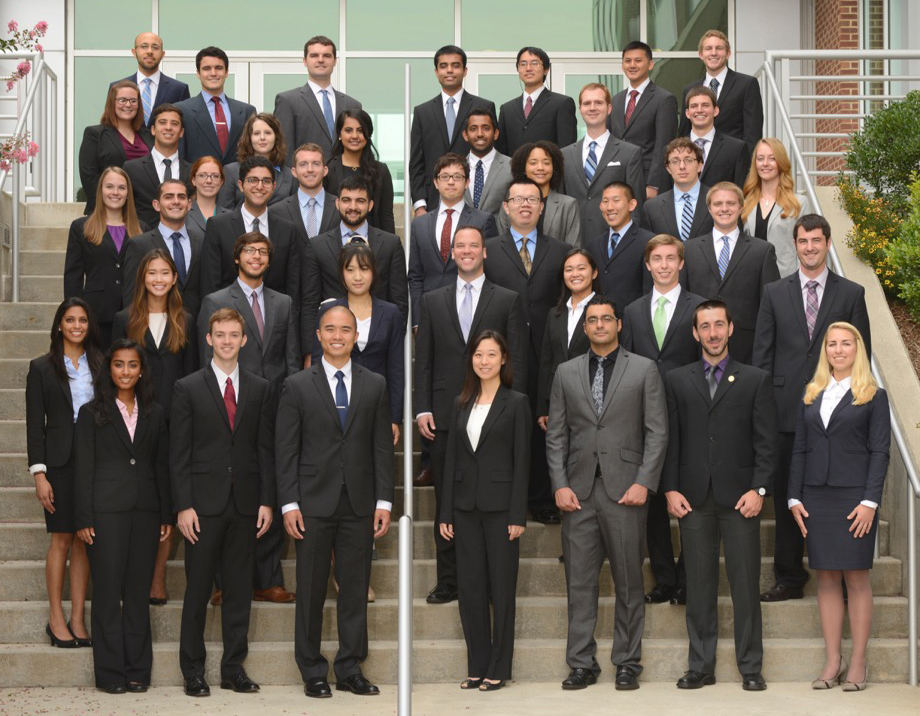Virginia Tech Carilion School of Medicine's new class sets bar for research experience

The Virginia Tech Carilion School of Medicine welcomed its most research-oriented class to date earlier this week. All members of the Class of 2019 arrived at the school with at least some research experience, and 81 percent of them had substantial research experience before entering medical school.
Members of the new class are becoming immersed through an intensive, weeklong orientation to the school’s curriculum, including its research focus.
“Research is a critical component of our curriculum and always has been,” said Dean Cynda Johnson. “Our emphasis on research really sets us apart from other schools. We are training scientifically oriented doctors who will look at the world with a questioning mind, who will always seek the best approaches to providing health care.”
One member of the class is Timothy Nguyen of Centreville, Virginia, who conducted research in plant ecology with his mentor, Dorothea Tholl, an associate professor of biological sciences at Virginia Tech.
“Going to medical school has been my dream for the past eight years,” Nguyen said. “I think my research experience has helped me and will continue to benefit me in the years to come.”
The Virginia Tech Carilion School of Medicine’s research curriculum is rigorous. New students are expected to select their areas of research and mentors before their second year. Across the four years, they will spend more than 1,200 hours on research, culminating in an academic research paper of publishable quality.
Selection for the new class began with a record number of applications: 3,572, of which 42 students — just over 1 percent — were ultimately accepted. Sixteen members of the new class are Virginia residents, and nearly one-quarter have already earned advanced degrees.
The undergraduate schools represented in this year’s entering class include Brown University, Davidson College, Duke University, Georgetown University, Johns Hopkins University, MIT, Northwestern University, the Rose-Hulman Institute, Swarthmore College, the University of California, Berkeley, the University of Maryland, the University of Pennsylvania, the University of Virginia, the University of Washington, Vanderbilt University, Virginia Tech, Washington and Lee University, and William & Mary.
Graduate schools represented include American University, Boston University, Brandeis University, Georgetown, Johns Hopkins, and the University of Pennsylvania.
New student Amie Calimlim, originally from Birmingham, England, and a graduate of George Mason University, said she was attracted to the Virginia Tech Carilion School of Medicine because of the superior students she met while working as a scribe in the emergency department of Carilion Roanoke Memorial Hospital.
“I often watched third-year students from the school come through on their rotations, and their knowledge always impressed me,” she said.
A number of the new students said the small class size was a big draw for them.
“I look forward to being part of a small, close-knit group,” said Michael Ferguson of Washington, D.C.
Quan Phung of Annandale, Virginia, agreed.
“I’ve worked for large organizations,” he said. “I prefer to be in an environment where everybody knows your name.”
During orientation, new students also are introduced everything from the school’s learning environment and academic standards to policies and procedures, financial aid, and student counseling. A major highlight includes their first problem-based learning experiences, which offers them the opportunity not just to learn a patient case but also to meet the patient’s family members.
The Virginia Tech Carilion School of Medicine opened its doors to its first class in August 2010 and has since graduated two classes. The school is accredited by the Liaison Committee on Medical Education and the Southern Association of Colleges and Schools.
By Catherine Doss.




